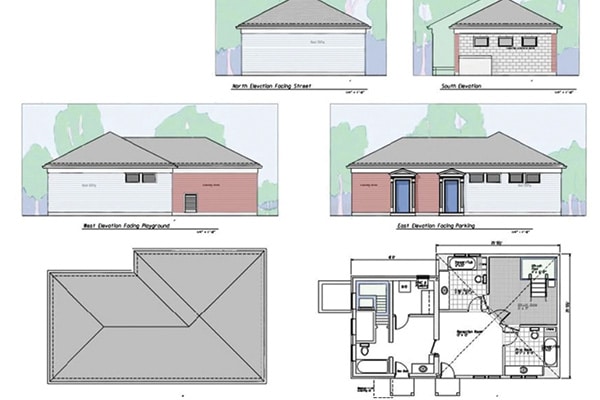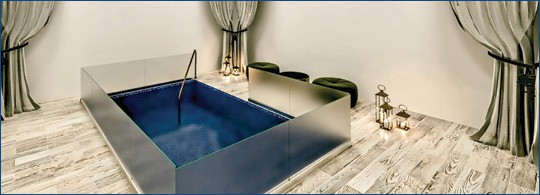Groundbreaking: Sunday, March 10, 1:30–3:30 pm
425 Washington Park, Norfolk
When Sarah Lipman moved from New Jersey to Tidewater less than four years ago, she saw a need for improvement in one particular aspect of the Jewish community. “I came and loved the community, but felt the mikvah needed help,” she says.
 In New Jersey she was accustomed to mikvahs that are “stunning, like spas,” she recalls, whereas the only Tidewater area mikvah is falling apart—in dire need of repair. The roof she notes, is literally falling down.
In New Jersey she was accustomed to mikvahs that are “stunning, like spas,” she recalls, whereas the only Tidewater area mikvah is falling apart—in dire need of repair. The roof she notes, is literally falling down.
“Going to the mikvah should be a spiritual experience,” Lipman says.
And, so, Lipman set out to remedy the situation.
After speaking with Chamie and Rabbi Sender Haber, and then with Kevin Lefcoe, Lipman assembled a team to begin the process of adding a modern wing to the current facility.
With a grant of $100,000 from Mikvah USA, a campaign was launched and plans were drawn.
“A mikvah is integral to a Jewish community,” says Art Sandler. “This addition should be celebrated by the entire community.”
Ultimately, Sandler notes, people of all levels of Jewish tradition use the mikvah, such as for conversion. “We should all come together to support this endeavor,” he says. “After all, without a mikvah, we can’t have conversions.”
“We are very proud to have a community Mikvah here in Norfolk,” says Rabbi Sender Haber.
“At the moment, approximately 25% of the women who use the mikvah come from outside of the Orthodox community. With our new-state-of-the-art wing, we look forward to enhancing the experience of those currently using the mikvah,” says Rabbi Haber.
“Just as importantly, we hope to create a more attractive opportunity for any women in the area who wish to be involved in this mitzvah. Immersion in the mikvah is a very meaningful and personal ritual that should transcend denominational labels,” Haber says.
Jonathan Leavitt, AIA, a Boston-area architect and engineer, and a Norfolk native, agreed to design the new wing. Leavitt’s father, Sheldon Leavitt, designed the original Norfolk Mikvah in the 1950s.

In fact, Leavitt says that between his father and grandfather, they were involved with the design and building of 52 synagogues. So, his design of this facility follows in their “design steps,” so to speak.
“There’s sort of a mikvah revival going on right now and the Norfolk Mikvah is part of it,” he says. “It’s great to enlarge the current facility.”
Mikvah USA helps build mikvahs around the country and then assists with the process. “One of their contractors has come to Norfolk,” says Lipman “to go over the plans as there are a lot of rules to make sure it’s kosher.”
The new wing is to be for women only, for Family Purity. The current facility will be updated and used for men and conversions.
Two preparation rooms and brand new mikvah facilities are planned for the new wing. The mikvah will feature state-of-the-art interior design and offer women a relaxing and spiritual experience. The collection of water and mikvah reservoir are being designed in consult with the most cutting edge mikvah designers in the United States and the building process will be overseen by Rabbi Yitschok Treiger and Mikvah USA to ensure that the Norfolk Mikvah complies with the highest levels of halacha. In addition, the mikvah will incorporate innovations in water treatment and energy conservation, according to its brochure.
In addition, the mikvah will be handicapped accessible, notes Leavitt. “It will be possible to roll right in.”
With the new facility, Leavitt says, “there will be three times the capacity.”
“We are taught that building a mikvah should precede building a synagogue or even purchasing a Sefer Torah,” says John Strelitz, United Jewish Federation of Tidewater president. “This addition is an important step for our community.”
The Norfolk Mikvah Campaign hopes to raise $400,000. In addition to Mikvah USA’s grant, Lipman says approximately $80,000 has been pledged.
The ground breaking will feature Rabbi Baruch Cywiak, project manager for Mikvah USA. Current estimates call for completion in September.
“A beautiful mikvah can be life-changing for a community,” says Lipman. “We want more people to know about the mikvah and to use it.”
By Terri Denison

